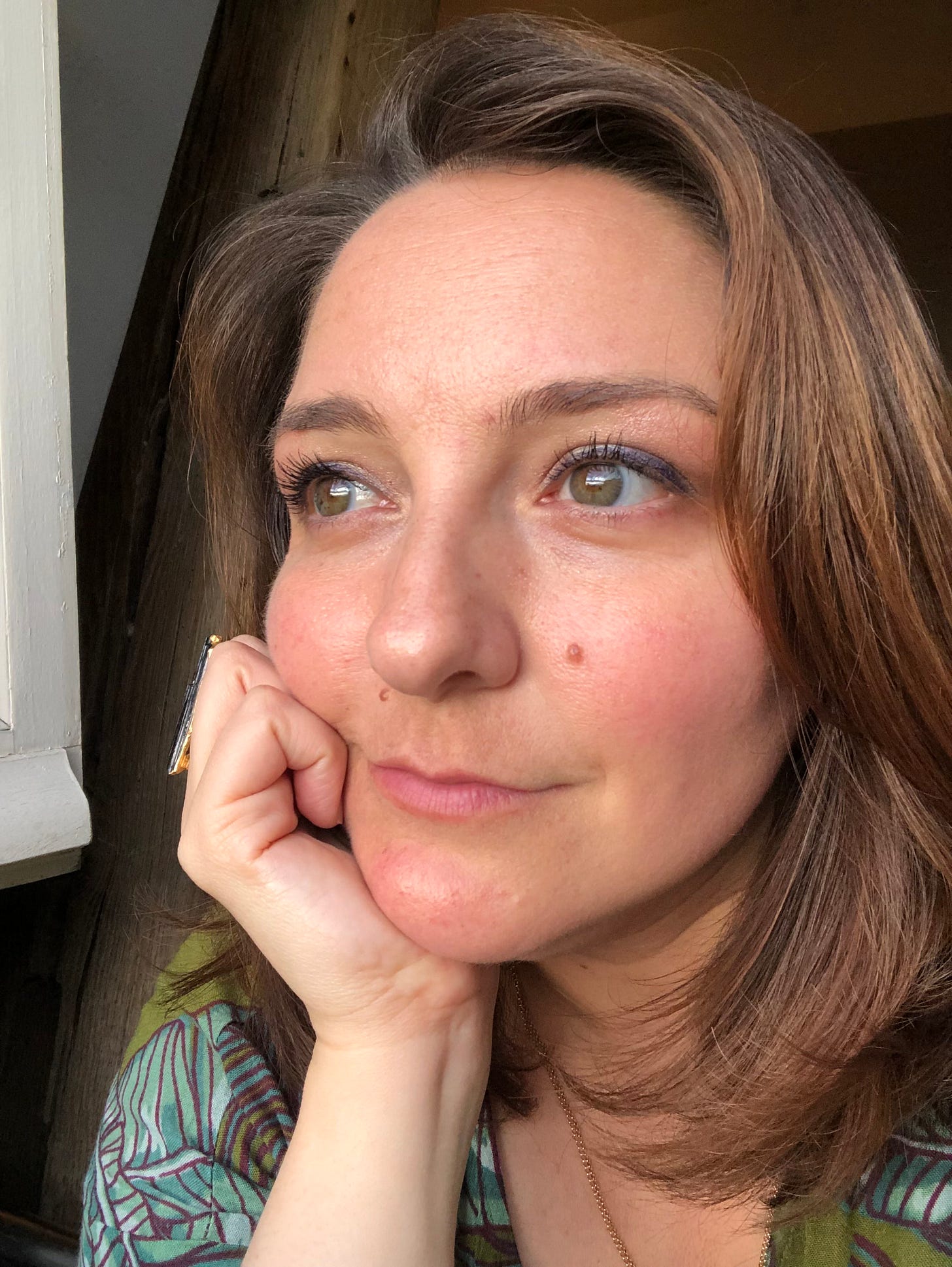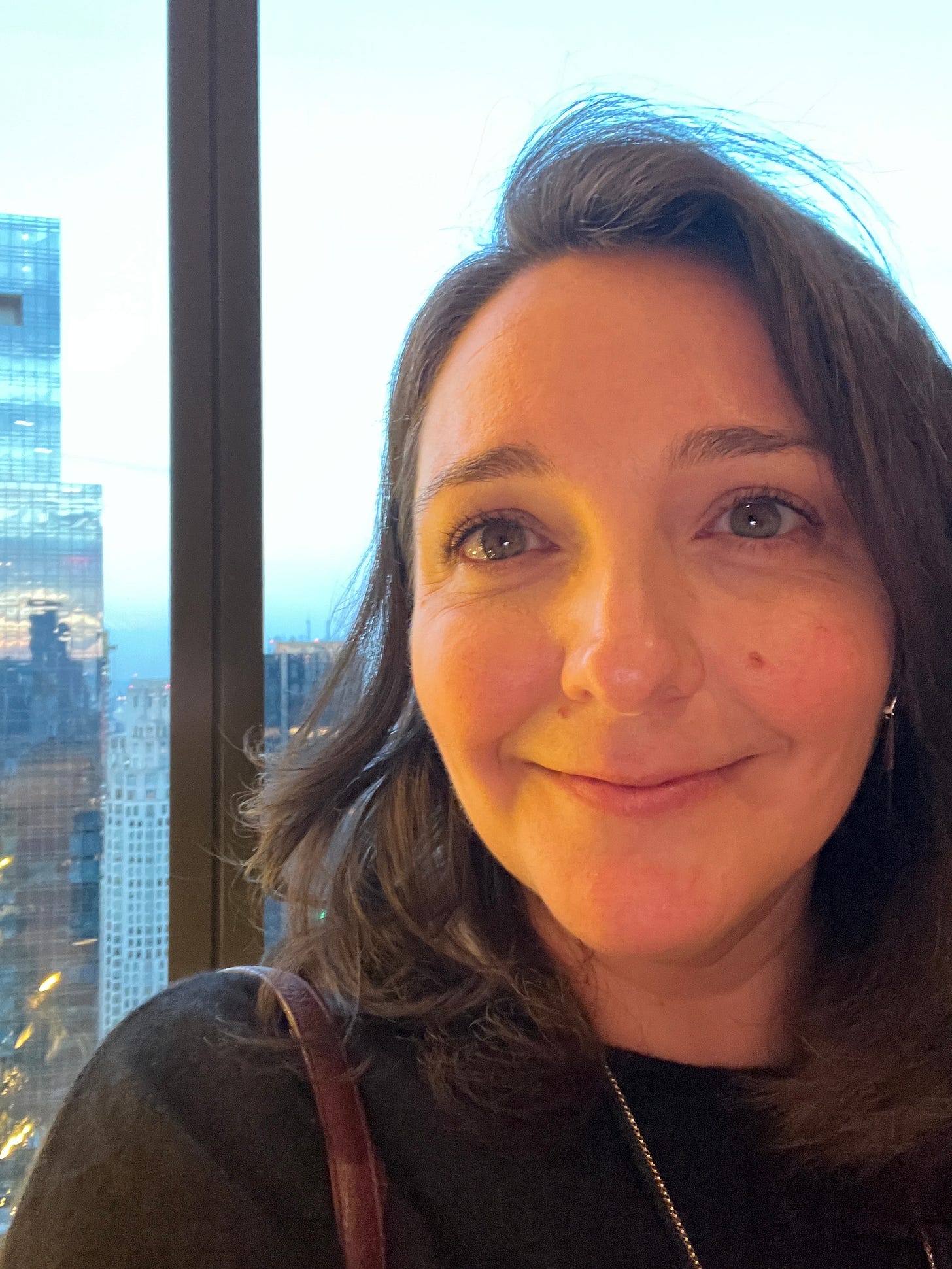Off the Page: Featuring Carla Zanoni
"Finding inspiration is actually a practice in and of itself — keeping myself open to awe and wonder. With that said, it’s rare that I can’t find inspiration on a subway ride or in my garden."
For over two decades, I have supported writers as an editor, publicist, and book coach, at various publishing houses, universities, corporations, and organizations. Through this journey, I’ve discovered that the quality of a writing life extends far beyond merely putting words on a page. It encompasses all the activities we engage in when we’re not writing. This insight inspired me to create Off the Page: Conversations About Writing as a Practice, where I feature writers sharing their diverse routines—from yoga and meditation to walking, reading, and even Olympic weightlifting. There’s no one-size-fits-all approach to writing, and there are as many ways to forge a writing life as there are humans on the planet.
This week, I’m so excited to feature a beloved inaugural member of the Narrative Healing community, writer, poet, and media strategist Carla Zanoni!
Bio: Carla Zanoni is an award-winning journalist, writer, poet and media strategist. Knowing/Saber, her Spanish-English chapbook, was published in 2024. She is writing her first book, a memoir on self-worth. Carla heads up the Engagement Journalism program at the Newmark Graduate School of Journalism at CUNY, and works with publishers and thought leaders on media strategy. She was named the first global Audience & Analytics Editor – and first Latina – to be named to the masthead of the Wall Street Journal, and served as TED’s first head of audience development. Carla got her start as a community reporter in New York City, working for various publications, including the award-winning hyperlocal DNAinfo New York and Chicago. Her work has appeared in The New York Times, The Common, Modern Loss, TueNight and many news and literary publications. She studied at the One Spirit Interfaith Seminary and splits her time between New York City and The Catskills with her husband and their cat and dog, Earnestine and Gertrude.
Lisa Weinert (LW): How is writing a healing practice?
Carla Zanoni (CZ): We live in a busy world with so many messages and agendas thrown at us from the moment we wake up (note to self: stop scrolling immediately upon waking). I have found that writing is an anecdote to that deluge. The moment I begin writing the world slows down and I am able to meet myself on the page – my heartbeat slows, my muscles loosen, and my mind clears. It is in that practice of meeting self that I have found the greatest healing.
LW: How is writing healing?
CZ: In my own life, I've experienced how writing with healing intention has helped me navigate grief, get really clear of my values, and build resilience in the face of challenges. It's been a constant companion in my journey of self-discovery and personal development.
My experience writing my memoir and my first chapbook was one of catharsis followed by emotional clarity, then craft, refinement and publishing process. Being honest with myself through my writing has led to the greatest healing.
LW: What is the difference between “traditional writing” and “writing with a healing intention?:
CZ: I had to unlearn many of the traditional writing skills I was taught in school and as a journalist. Traditional writing is great for imparting information in a digestible and often linear manner, but “writing with a healing intention” is about tapping into flow and art and beauty. It is about the act of writing rather than the output. For me, the “healing” aspect of the writing practice is about allowing myself the joy of writing rather than focusing on where the writing is “good” or whether it will be published. All of that stuff comes later. First I need to feel into the practice to allow the words to come into being. Later, I can invite in my more linear self — the editor, marketer, etc.
LW: What role does movement play in your writing life? Do you return to any somatic practices, mindfulness exercises, or other rituals before or after you write?
CZ: I like to do some wrist rolls before I start writing. I’ve learned that my wrists hold on to a lot of energy, and often pain. Rolling them releases some of that attention while also signaling to my body that I’m making time for my writing.
I also keep several stones at my desk and like to select a color that inspires me in that moment. I smooth the stone between my fingers and thumb and breathe deeply before turning my attention to the keyboard and screen.
Doing so helps me reconnect with my body, mind, and spirit in the moment and let go of what came earlier in the day. It’s not important when I am looking to write. All that is important is the current moment.
LW: What role does meditation play in your creative life?
CZ: I have found that I cannot create without the pause of meditation. Sometimes my practice is formal, Metta practice or guided meditations, and sometimes it’s casual, like setting the intention to really “see” what is in front of me — leaves on the tree on my block, cracks in a concrete sidewalk, the mountains on my drive — instead of just sprinting past. It’s in that slowness that I can tap into a different frequency and flow than the persistent and numbing chatter of my mind at any given time.
LW: How have you seen this practice work in author’s lives?
CZ: Many authors I've interacted with have shared how writing has helped them process trauma, navigate difficult life transitions, and gain deeper self-understanding. I've seen authors use writing to explore their identities, confront recalcitrant personal beliefs and work through trauma. I’ve also seen, and experienced, the incredible sense of community and powerful connections with readers that comes from this practice.
LW: Where do you find inspiration?
CZ: Finding inspiration is actually a practice in and of itself — keeping myself open to awe and wonder. With that said, it’s rare that I can’t find inspiration on a subway ride or in my garden. I am naturally curious (some might call it nosy), and snippets of conversation — whether the Tower of Babbel of the A train or the murmurs of a babbling brook — ignite my artistic brain. I like to think that if I hadn’t first become a journalist, I might have been an anthropologist. There is something about observing and connecting the threads cast by the nature of bustling humanity and fauna and flora that helps ideas come through. It fuels my creativity.
LW: How has sharing your work changed your life?
CZ: The biggest perspective that shifted for me was the understanding that sharing my work has little to do with validation from others. Instead, I realized the act of sharing my work provides me with a sense of confidence in my artistic expression. And in being vulnerable with others, I have been gifted with tremendous friendships and a sense of community. Some of my dearest friendships have come from sharing writing work with one another. There is a deep reverence and respect for one another that comes from hearing someone be willing to share in that form.
LW: What writers have influenced you the most?
CZ: Mary Karr, for her profound honesty and humor; Ross Gay, for his pure commitment to seeing the world through the lens of joy and justice; Marie Howe, for her poetic honesty and devastating emotionality; Deborah Levy, for her ability to make the domestically mundane so alive; and Mary Oliver and Walt Whitman, for their ecstatic writing. It is all a form of prayer.
(OK, I can’t stop there, because we also have — in no particular order: Annie Dillard, Mary Gaitskill, Lucille Clifton, Jeanette Winterson, Maya Angelou, Dani Shapiro, Melissa Febos, Eve Babitz, Joan Didion, Rebecca Solnit, Jorge Luis Borges…and so many more.)
LW: What book are you excited to read next?
CZ: “Long Island,” by Colm Tóibín. I loved his book Brooklyn and this follows that story years into the future. I’m also looking forward to reading Rachel Cusk’s “Outline trilogy,” which I understand to be a quiet series of books about conversations with people. I like the idea of just listening to her characters talk. There is something so tantalizing (and writerly) about that kind of sanctioned eavesdropping.
LW: Is there anything else you’d like us to know?
CZ: Writing is all about giving yourself permission to enjoy the fullness of life and be your true self. I recommend it.







really truly love learning and now knowing all of this about you. xo
Practical, profound, revealing, so useful and… I loved it!